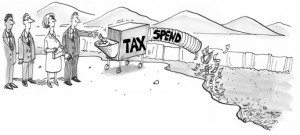Most Western countries are experiencing a revolt against the intellectual and political elites who have governed  nations, the media, academia and central banks for as long as most adults can remember.
nations, the media, academia and central banks for as long as most adults can remember.
While the country-specific details vary slightly, the common wisdom of these elites has produced ever increasing state intervention in our economies as well as in our personal lives, along with the near destruction of the family, a huge increase in victimization/entitlements, crony capitalism, no borders, impossible debt, declining education, limits on free speech, immigration nightmares, economic stagnation, permanent politicians, and greater income inequality.
With that track record, is there any wonder that the revolt is underway?
The question I am currently wrestling with is what is to replace the common economic and political wisdom of the past eighty years, and how will that transformation take place?
Will we decide that all intellectuals/academics/politicians are misguided, refusing to listen to any higher order thinking, in a Nihilist/Luddite “intellectual terror”, like the real terror that destroyed the early movers of the French Revolution? I hope not.
But what is the alternative? Every aspect of our culture has been almost completely and unconsciously co-opted  into the Keynesian/Krugman assumptions that more government is better, and that the state must intervene to fix what would otherwise be economic chaos, as well as to insure more equal economic and social outcomes.
into the Keynesian/Krugman assumptions that more government is better, and that the state must intervene to fix what would otherwise be economic chaos, as well as to insure more equal economic and social outcomes.
What if, with a recession starting, our Fiscal and Monetary Policy elite proposed to do nothing, or to cut spending and raise interest rates? That is exactly what happened from 1921-23 under Warren Harding and Calvin Coolidge, when the country was dealing with corrections to farm prices, industrial organization, and an increased civilian work force after World War I. See an interesting article by Robert P. Murphy on “The Depression You’ve Never Heard Of: 1920-1921”.
It’s hard to imagine a current President having the courage to follow Calvin Coolidge’s strongly held belief that it is better for the free market to quickly correct itself with some short term pain, rather than to subject the country to years of zombie-like half-life under government interventions.
is better for the free market to quickly correct itself with some short term pain, rather than to subject the country to years of zombie-like half-life under government interventions.
Just the first chapters of Amity Shlaes great book The Forgotten Man: A New History of the Great Depression will convince you that the Great Depression was triggered by the Stock Market Crash, but that its severe depth and long length were caused by government intervention (pages 7-14).
I offer the contrast between 1921 and 1929 because they are almost textbook cases of the last time we believed enough in free market corrections to let them run their quick course in 1921, leading to seven years of economic prosperity, in contrast to the first time we believed so much in government intervention that we succumbed to its siren-song under Harding and later Roosevelt. Shlaes writes:
Government management of the late 1920’s and 1930’s hurt the economy. Both Hoover and Roosevelt misstepped in a number of ways. Hoover ordered wages up when they wanted to go down. He allowed a disastrous tariff, Smoot-Hawley, to become law when he should have had sense to block it. He raised taxes when neither citizens individually nor the economy as a whole could afford the change.
Roosevelt’s errors had a different quality but were equally devastating…the National Recovery Adminstration’s 
I offer this 1921 vs. 1929 example not because there is room here to explore in depth the two periods, but as a kind of shock, a defibrillator, for those who think that government must intervene in order for the economy to function. That premise is today’s common wisdom, but it is not true. Splash yourself in the face and think it again: government intervention in the economy probably causes more problems, particularly in the long run, than it solves.
If that revived premise, an emphasis on free markets and individual decisions without government tampering, is ever going to take root and begin to grow even the shortest of new shoots, where can we send politicians, academics, media pundits, Federal Reserve Governors, and the average citizen for the necessary intellectual foundation to begin to believe it?
For your reading list in 2017 I offer three works which should both enlighten and entertain.
The first is Henry Hazlitt’s great primer, Economics in One Lesson. I have praised this short book on these 
A current example of Hazlitt’s first truth is the long term effect of eight years of government-induced super-low interest rates. Intended to stimulate borrowing and spending, which might happen in the short run, unless household debt is already maximized, the long term effect has been to decimate the returns from savings, and therefore reduce current and future spending by those who saved and rely on savings to live (i.e., the ever increasing number of retirees).
Second is F.A. Hayek’s classic The Road to Serfdom, written over a decade while the young Austrian economist taught at The London School of Economics before and during World War II. A profound reaction to the rising statism on both the right and the left in Europe in the 30’s, Hayek’s work explores the important core foundations of a free, democratic and prosperous nation.
If the book looks too large to tackle, start with the last chapter to whet your appetite. Here is a brief example:
A movement [collectivism/statism] whose main promise is the relief from responsibility cannot but be antimoral in 
The final book is David Stockman’s ill-titled but very absorbing Trumped! A Nation on the Brink of Ruin, and How to Bring It Back. Writing before the election, Stockman identifies why Trump is so popular in Flyover America; but he is also critical of many of Trump’s pronouncements and fuzzy policies. The book is not an endorsement of Trump. Rather it is a witty and caustic attack on decades of wrong-headed economic policy. 
So you might give one or more of these books to family members, to teachers at your kids’ schools, and to colleagues at work, and then have a discussion. Or send copies to elected officials and to media talking heads. Maybe if they receive enough copies, they will take time to read them!
The hope is to convince everyone in the public square that not all intellectual elites are wrong—just the ones we’ve been following in lemming-like lockstep on economic policy for the past eighty years.
It sounds so good and easy to say that the government, through its laws, regulations, incentives, taxes, programs and interventions will grow the economy, end economic cycles, and benefit all of us. But it is not true, and basing policies which critically impact millions of lives on falsehoods is not conducive to economic growth or to national stability.
Read, think and discuss. Have a great 2017!


Comments